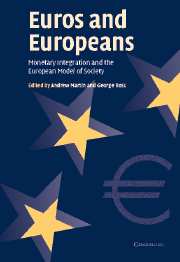Book contents
- Frontmatter
- Contents
- Preface
- List of contributors
- 1 Introduction: EMU and the European social model
- 2 The EMU macroeconomic policy regime and the European social model
- 3 Shaping a polity in an economic and monetary union: the EU in comparative perspective
- 4 Monetary integration and the French model
- 5 EMU and German welfare capitalism
- 6 Maastricht to modernization: EMU and the Italian social state
- 7 Constraint or motor? Monetary integration and the construction of a social model in Spain
- 8 The Netherlands: monetary integration and the Polder model
- 9 Belgium: monetary integration and precarious federalism
- 10 The political dynamics of external empowerment: the emergence of EMU and the challenge to the European social model
- 11 Welfare reform in the shadow of EMU
- 12 Industrial relations in EMU: are renationalization and Europeanization two sides of the same coin?
- 13 Conclusions
- References
- Index of names
- Index of subjects
Preface
Published online by Cambridge University Press: 22 September 2009
- Frontmatter
- Contents
- Preface
- List of contributors
- 1 Introduction: EMU and the European social model
- 2 The EMU macroeconomic policy regime and the European social model
- 3 Shaping a polity in an economic and monetary union: the EU in comparative perspective
- 4 Monetary integration and the French model
- 5 EMU and German welfare capitalism
- 6 Maastricht to modernization: EMU and the Italian social state
- 7 Constraint or motor? Monetary integration and the construction of a social model in Spain
- 8 The Netherlands: monetary integration and the Polder model
- 9 Belgium: monetary integration and precarious federalism
- 10 The political dynamics of external empowerment: the emergence of EMU and the challenge to the European social model
- 11 Welfare reform in the shadow of EMU
- 12 Industrial relations in EMU: are renationalization and Europeanization two sides of the same coin?
- 13 Conclusions
- References
- Index of names
- Index of subjects
Summary
The culmination of two decades of monetary integration, Economic and Monetary Union (EMU) fundamentally transforms the European political economy. Replacing national currencies with the Euro, EMU shifts monetary policy, the key instrument of macroeconomic policy and a core function of the modern nation state, to the European Central Bank (ECB), the most independent in the world. Although EMU leaves fiscal policy in the hands of the member states, it sharply limits their discretion over its use. In no other policy domain has there been such a centralization of power in a supranational EU institution. By providing increased economic policy autonomy against the forces of globalization, monetary union as such has the potential for enabling Europe to overcome the high unemployment that has increasingly strained the “European social model” since the 1980s. Offsetting this potential, however, EMU institutionalizes a highly restrictive macroeconomic policy regime which subordinates growth and employment to price stability. Unemployment can be reduced consistently with that goal, the ECB insists, only if “rigidities” in Europe's labor markets are eliminated by far-reaching changes in the social policy and employment relations institutions at the heart of the European social model.
The member states retain formal power over those institutions, however. There have been reforms in those institutions in response to problems internal to the national variants of the European social model, as well as pressures from monetary integration.
- Type
- Chapter
- Information
- Euros and EuropeansMonetary Integration and the European Model of Society, pp. ix - xPublisher: Cambridge University PressPrint publication year: 2004



